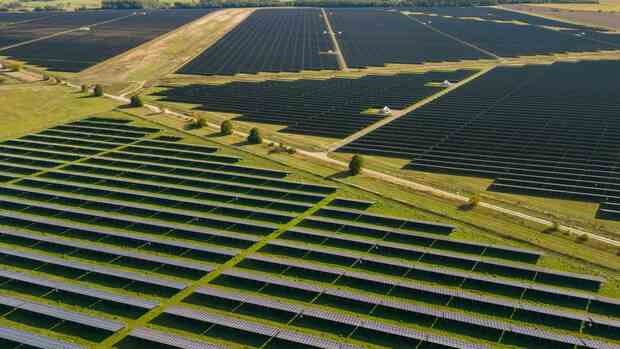Solar energy is to become one of the most important pillars of energy supply.
(Photo: IMAGO/Christian Ender)
Hardly any industry is as dependent on the good will of the Chinese government as the German solar industry. The dependency is absolute. And Beijing knows how to use this: The EU has hardly thought about ways to revive the European photovoltaics industry when Beijing brings restrictions on the export of machines for the production of important components for the PV industry into play.
That alone would have fatal consequences for the solar industry in this country. And that’s just a taste of what might happen if the conflict over Taiwan escalates. Or should there be incomprehensible price jumps for raw materials, cells and modules from China. None of this is unrealistic. So not preparing for such scenarios would be dangerous.
Because it is about one of the most important energy sources of the future. And for supremacy over the same.
As of now, Germany and Europe would be powerless. That should change now. The first signals from Berlin and Brussels give reason to hope that the solar industry’s problem with China has really been recognized. That was overdue. Because Germany’s dependency on China is significantly greater than Germany’s gas dependency on Russia.
Alongside wind power, solar energy is set to become one of the pillars of the new energy world. Almost 80 percent of the global production capacity for photovoltaic modules across all stages of the value chain is currently in China.
>> Read here: The China risk of the German solar industry
German politicians are responsible for the fact that it was able to come to this. While the Chinese government subsidized its solar companies without limits, the then black and yellow government drastically cut the subsidy rates for solar power – and without much warning.
There is no alternative to China
In the birthplace of solar energy, company after company went out of business, tens of thousands of jobs disappeared and China became the champion of the global PV industry. No other country even has the production capacities to satisfy the massively increasing hunger for solar modules.
The fact that export restrictions could now be placed on precisely those machines for which German companies like Meyer Burger first sold their know-how to China years ago shows the whole absurdity. Solarworld founder Frank Asbeck called the German solar machine manufacturers “gravediggers of the solar industry”. He should be right.
It is now a question of rebuilding with great effort what has been carelessly or even willfully destroyed in recent years. One thing is certain: reducing dependence on China will not come cheap – and it will not happen overnight either. This time, the warnings shouldn’t be heeded until it’s too late.
More: Paper from the Energy Agency: This is how the energy transition should still work.
